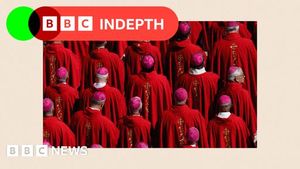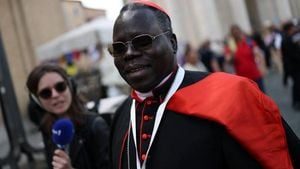Calls for another UK General Election are heating up, driven by some of the nation’s most recognizable figures, including the legendary actor Michael Caine. Less than six months after Labour's stunning victory, the public's appetite for political change appears insatiable, bringing forward questions about the current government's direction under Prime Minister Keir Starmer.
Recently, Caine took to social media to amplify the momentum behind a petition demanding another General Election. The petition, initiated by businessman Michael Westwood, has already garnered over two million signatures, indicating widespread dissatisfaction with the Labour government's actions since its election.
Caine, who is well-known for his roles in films like The Italian Job, tweeted out the link to the petition, prompting significant engagement online. “Call a General Election - Petitions,” he wrote, sparking supportive comments from fans as well as critiques. One user exclaimed, “I knew there’s a reason I like you so much,” highlighting Caine's continued influence and public appeal.
While the star's backing bolstered the petition's visibility, other notable figures have jumped on the bandwagon as well. High-profile political personalities like Nigel Farage and even tech mogul Elon Musk have lent their voices to this growing chorus. Farage claimed the petition amassed around 750,000 signatures within 24 hours of its launch—an impressive feat reflecting the public's discontent.
Critics of the Labour government have voiced their frustrations, with many arguing Starmer's administration has strayed from its pre-election promises. Westwood himself described the disillusionment felt by many voters, stating, “I believe the current Labour Government have gone back on the promises they laid out.”
Yet, not everyone supports the petition. Former Countdown star Carol Vorderman took to social media to express her disapproval, stating, “Let’s have a Rejoin the EU referendum at the same time?” A nod to the contentious Brexit debate still echoing through UK politics, Vorderman’s comments reflect the broad spectrum of public sentiment concerning governance and representation.
Labour's initial landslide victory was touted as offering the “sunlight of hope” to Britain after years of Conservative-led austerity. Starmer claimed he would introduce transformative policies, but his recent decisions, particularly the scrapping of winter fuel payments for vulnerable pensioners, have led many to feel betrayed. Critics argue this move could drive tens of thousands of elderly citizens below the poverty line.
Addressing this public outcry, Prime Minister Starmer acknowledged the gravity of the situation, stating, “At the moment, until we bring in the changes, the allowance is paid to everyone, regardless of their circumstances.” His remarks came during heated discussions on BBC Radio Lincolnshire, where he attempted to soothe growing division within his party and within the public.
The urgency of the call for another general election symbolizes not just the immediate reaction to government policy but also reflects the underlying tensions present within British politics. With over two million signatures, the petition for fresh elections is now pinned against Labour’s fragile governance. The threshold for parliamentary debate surrounding petitions stands at 100,000 signatures, positioning this movement to potentially reshape the political dialogue.
This demand for renewed democratic engagement isn’t without its challenges. According to political analysts, Starmer’s leadership and the consequent lack of public trust could have lasting repercussions for Labour if the situation isn't handled delicately. Reform UK’s deputy leader Richard Tice expressed his encouragement to citizens, urging them to support the petition widely, whilst some Labour MPs have begun expressing concern over the potential fallout of the public's frustration.
The next steps will be pivotal, as government responses to such highly charged petitions not only shape public opinion but also signal Labour’s responsiveness to its electorate. The political atmosphere remains rife with speculation—what happens next remains uncertain. With names like Caine, Farage, and Musk rallying public sentiment, pressure on Starmer’s administration is mounting.
The course of the next general election, whether it will happen sooner than anticipated, or if Labour can manage to stabilize public sentiment during this tumultuous chapter, remains to be seen. Caine’s involvement and the subsequent rise of the petition spotlight just how quickly public opinion can shift and how the desire for transparency and effective governance continues to dominate UK political discourse.
It seems the long history of political engagement is as significant as current affairs. Now, with every like, repost, and signature, the voices behind this call grow louder, potentially marking the era of significant political change.



